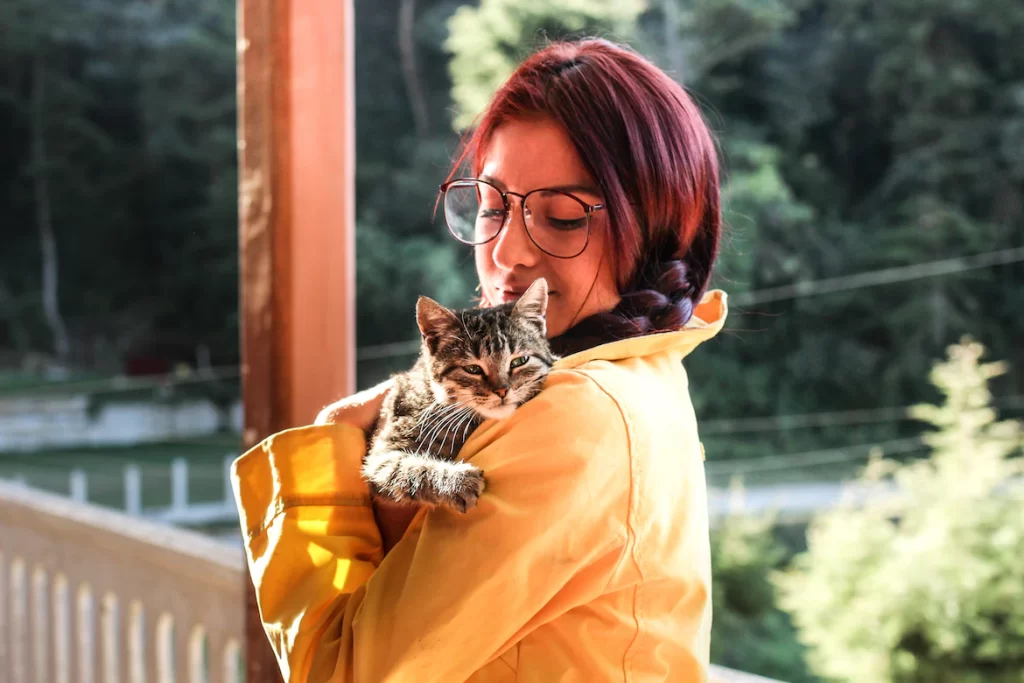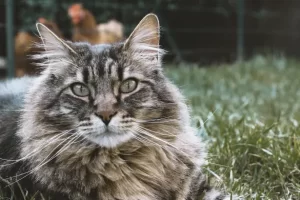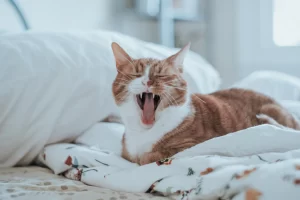Last updated on January 29th, 2023 at 12:26 am

Sometimes you may go away for a long time, such as going to college, and you may wonder if your cat still remembers or even misses you. A person may be difficult to know how long a cat can remember, though this depends on the cat and what kind of interaction between the person and the cat.
To give you a quick and short answer, if a person exists in a cat’s long-term memory, it can remember the person’s face for about 10 years. For short-term memory, a cat can hold up information for about 16 hours.
Dive in to see some interesting facts about a cat’s memory and if you read all the way to the end, we will show you different ways to improve a cat’s brain health.
Short-term and long-term memory in a cat
Short term memory
Working memory, or short-term memory, is what your cat uses daily and is essential for social interactions and remaining attentive. For your cat’s survival and problem-solving, the working memory stores information that is directly relevant and general. A cat’s short-term memory lasts an average of sixteen hours. The cat’s mode of information acquisition is also crucial since memories associated with motion or position are retained longer than those associated with information just seen.
Long term memory
Long-term memory is the vital information your cat retains for a very long time, possibly forever. Typically, a cat can remember its owner’s face for about 10 years. Although less readily available than short-term memory, this information is still present, and the cat may recall it when necessary. All animals need long-term memory since it’s essential for avoiding danger, seeing ideal spots for gathering food, finding hunting places, and staying out of trouble. Cats have two types of long-term memory: implicit and explicit. Implicit memory is the type of memory that deals with unconsciously happening events like moments. Cats frequently have implicit memories of grooming and pursuing their prey. Explicit memory entails memories that can cat consciously recalled, such as stressful visits to the vet. Do you want to know how long a cat can remember a person? Read on to learn exactly that.
Difference between a kitten and an adult cat’s memory
An adult cat’s memory
Cats’ memories deteriorate with age. Similar to older people, senior cats find it challenging to retain information from their earlier years. It won’t automatically forget you if you haven’t spoken to your senior feline buddy in a few weeks. Elderly cats do, however, lose brain tissue. It leads to memory loss and impairs their capacity for understanding new information and memorization. According to several investigations, aging affects a cat’s short-term memory more than long-term memory. So rather than learning something new, it would be simpler for elder cats to recollect a memory from the past. Certain conditions, such as feline cognitive impairment, can damage an adult cat’s memory and general behavior to the point where it loses its regular sleeping and eating patterns and willingness to socialize.
A kitten’s memory
Even though young kittens, especially newborns, haven’t reached their full cognitive ability, memories are still forming in their minds. They acquire their survival skills thanks to these recalling things. The first two to seven weeks are most crucial for kittens of all breeds to lay the groundwork for their memory. Kittens develop many early memories thanks to their natural curiosity, liveliness, and enthusiasm to explore things. These memories and natural instincts will be of utmost significance throughout the cat’s existence.
What Do Cats Typically Remember?
For felines, the memories that stick with them the longest are usually those connected to notably pleasant or negative situations; however, they may differ depending on the cat and their specific experiences. Here are some of the things they mostly recall:
Food they take
A cat can remember the positions of essential food sources and the individuals who provide them with food and care. They can remember where to find their food bowls and return to them when they need more.
Bad encounters
Your rescue cat may be acting in a certain way as a result of unpleasant events in the past. Certain objects, such as tall men, or particular scents, cause unfavorable reactions in some cats. When a cat reacts this way to a specific situation, it’s a sign that it is experiencing triggers—instances that the cat connects to anything unpleasant that has happened previously.
Other cats
Kitties can remember another cat, but their memory duration relies on the interaction’s nature. Cats swap scents with kittens to help them remember one another in case they become separated, and they continue to employ this strategy as adults. There is a reasonable probability that your cat will recognize the other cats it first met when it was a kitten and later reencounter them.
Familiar locations like where they live
Cats can remember important places like where they live, and sometimes, they may disappear for a while but mostly come back. Some cats can even track their home from miles away, thanks to their memory.
Their owners
Cats recall details about people, including their owners and close friends. The likelihood that the cat will identify that person using their long-term memory increases with the time the cat and the human interact.
Do cats miss you when you are gone?
Let’s say you go on a 2 weeks vacation. When you come back, do you think your cat still remembers you and misses you?
Cats can appear distant and uninterested in their owner’s emotions because they are, in fact, more autonomous than their canine counterparts. However, they strongly bond with their owners and view them as essential caregivers. Knowing whether your cat misses you can be rather challenging. Here are some of the ways you can tell your cat misses you when you are away:
They have separation phobia
Cats can experience separation fear, particularly in cats with solid connections to their owners. Their separation phobia can manifest as extreme crying, destructive conduct, and overgrooming.
They try to gain your attention
When you are home, some cats may persistently try to seek your attention. They may paw, meow, or howl at you nonstop. They might also try to stop you from doing your work or block your path to the thing that has your interest.
They become depressed
If their owners are gone for an extended period, and the cats miss them, they may start to feel unhappy and depressed. When depressed, cats may show signs like appetite loss, weight changes, grooming excessively, and inactivity.
They become affectionate
A clear indication your cat misses you is affection. Your cats show that they are glad you’re back if they approach you when you get home. They can express love by trilling, meowing, purring, lying on your lap or next to you, or grooming you. Felines also show affection through giving headbutts, being around you most of the time, and rubbing themselves in your face. Cats can convey their love, rage, and fear by making eye contact. A sign of friendly eye contact is when your cat stands near you, looks at you, and blinks gently.
They may display destructive conduct
Felines frequently begin acting destructively when they are lonely or bored. They can start scratching things around the house, stop peeing in their litter boxes, and chewing different objects. When you’re not home, your cat could exhibit destructive actions to let you know that they do not like it when you are away.
How to improve a cat’s brain health
Have some playtime with them
You can play with your cat or go on walks with them every day. Playing should be scheduled frequently to keep your cat interested and the memory sharp. Your cat will become lazy and mentally sluggish without that regular stimulus.
Giving them nutritious cat food
The brain requires sustenance just like any other organ in the body. When your cat reaches old age, you need to pay more attention to what you feed them. You must provide her meals that will be nourishing and excellent for the brain as they age. You can improve your cat’s cognitive function by switching to healthy, high-quality cat food abundant in taurine, omega-three and six fatty acids, selenium, vitamin C, and vitamin E. Such foods have powerful antioxidant capabilities in addition to aiding in preventing brain cell deterioration.
Make playing or climbing areas for them
Lack of physical stimulation is one factor that affects cats’ memory state. They cannot use their house or yard because it is too dull. Cats require room to climb and stalk because they are adventurous creatures. They enjoy perches or high places, such as bookshelf peaks or shelves. You can construct a play area for your cat or remove things from your shelf space to give it room to climb and run.
Also read: Best Quality Cat Trees
Get a younger kitty or another pet to play with your cat
Your cat might benefit from having a companion to keep them engaged and motivated. An older cat will benefit most from meeting a younger cat that they can play with, raise, and be around. However, getting another energetic and active animal nearby will do wonders for your cat’s energy levels, which is fantastic for its mental clarity and memory.
Giving them supplements
Many supplements for cat brain health are offered online or at pet stores. The best thing about these supplements is that you don’t need a particular prescription to acquire them; they’re relatively pricey and come with instructions for the proper quantities. It is best to always check with a vet before providing any supplements to your pet.
Conclusion
Felines have short- and long-term memory, and they vary based on age; younger cats have more excellent memory than older ones. They can remember people and things they find around them often for years. However, cats can recall things they encounter once for a short time and sometimes for about sixteen hours. It is usual for cats to miss you when you are away, and they have different ways of showing it. Exercising, proper diet and supplements are keys to improving your cat’s memory. Hopefully, this article has answered your question about how long a cat can remember a person.


